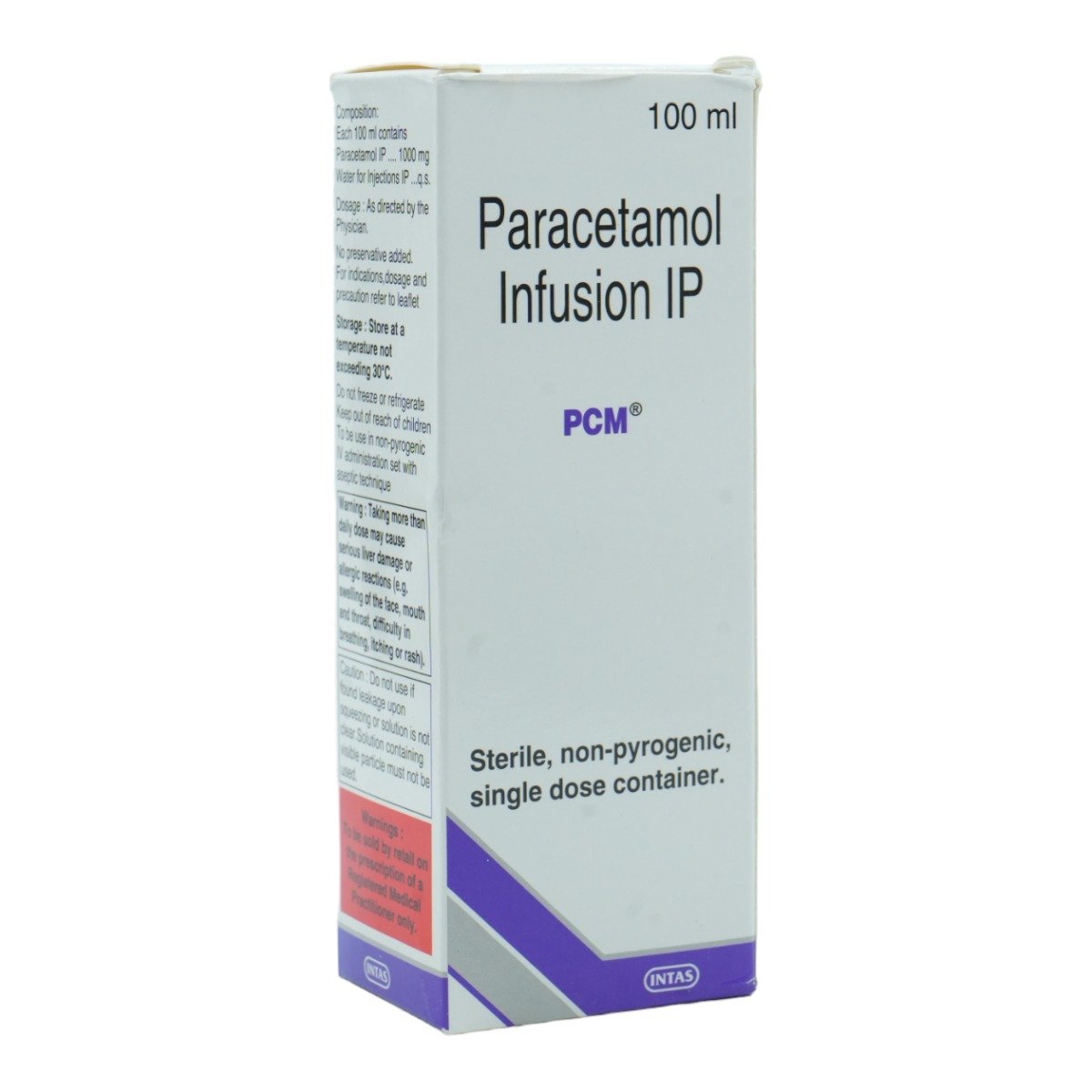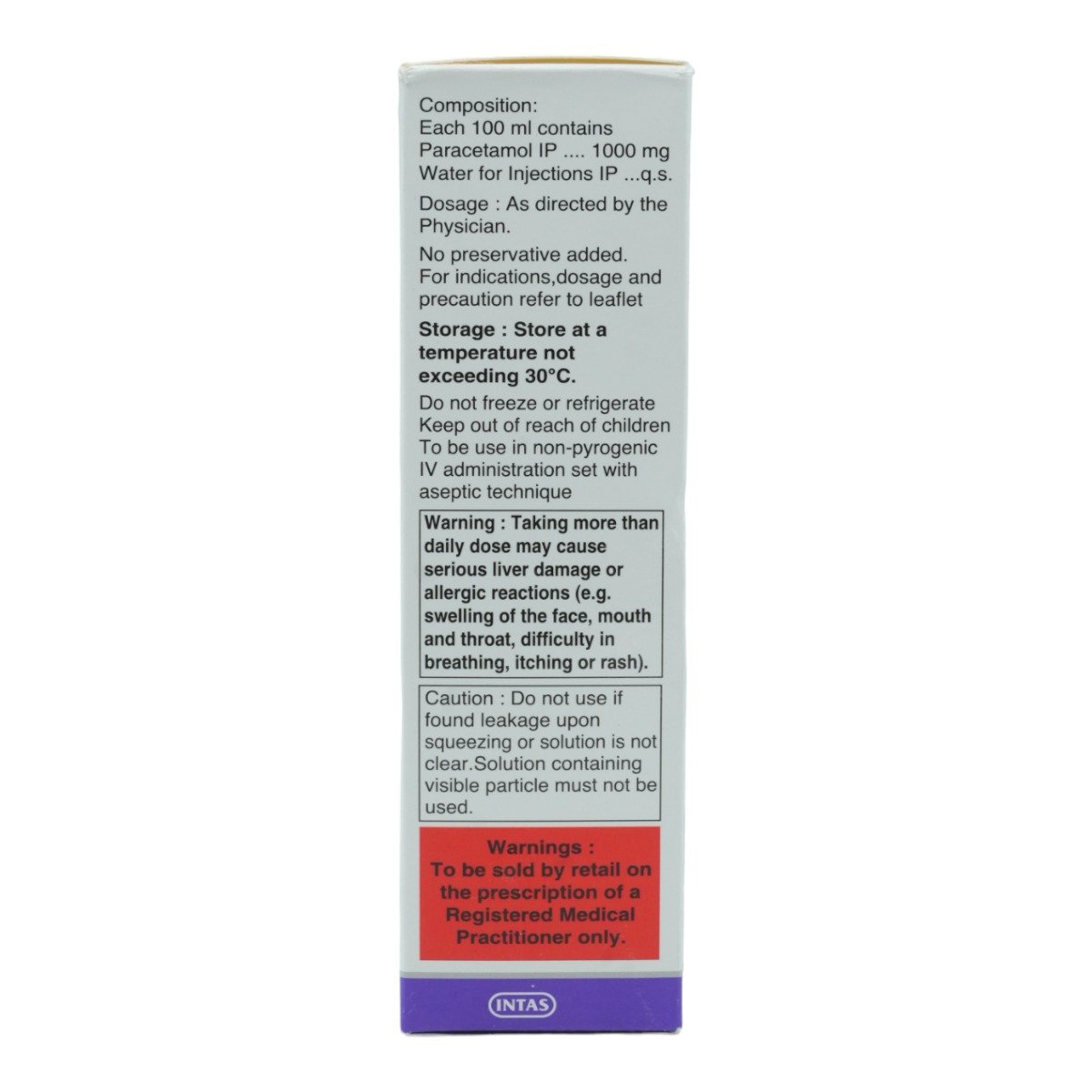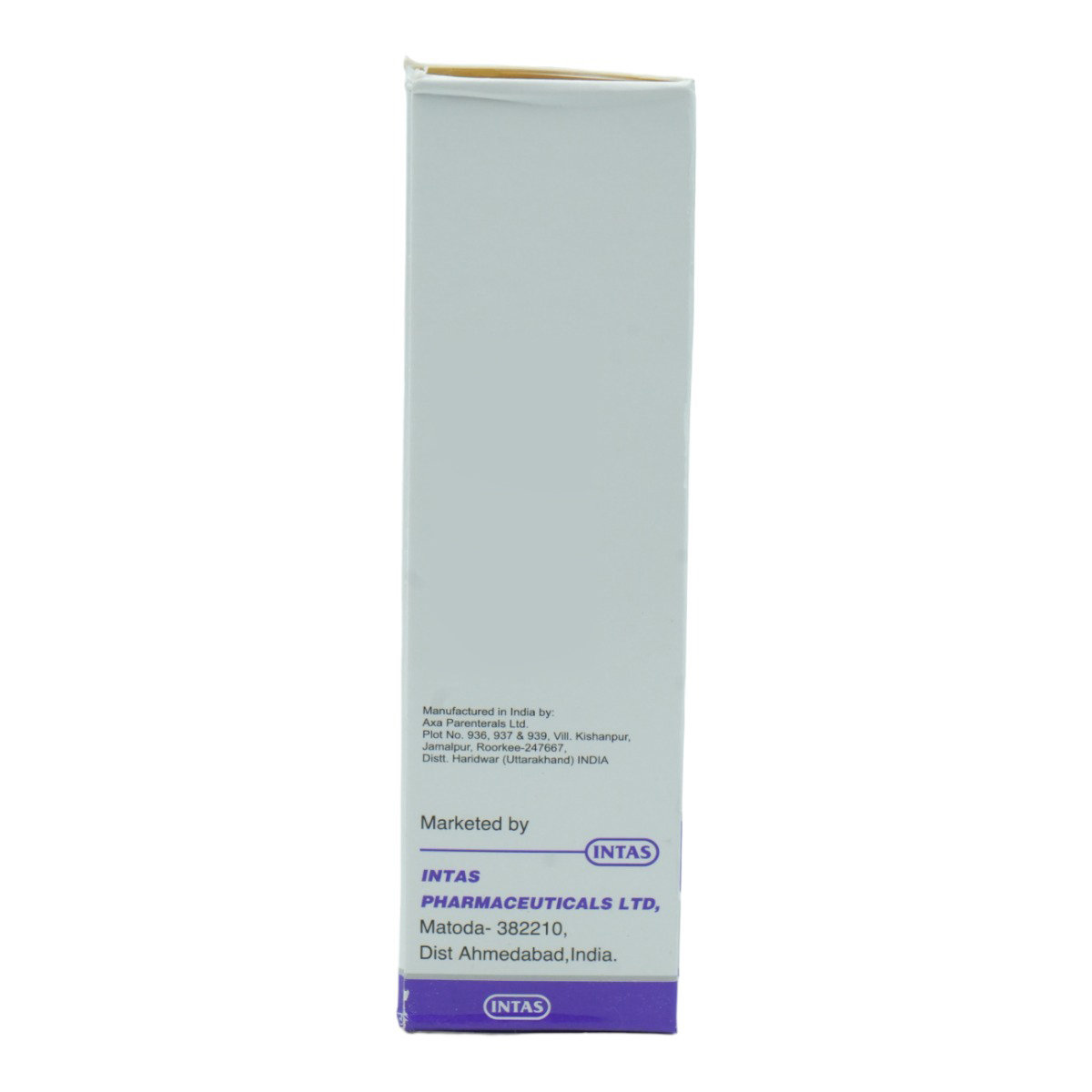PCM Infusion 100 ml
PCM Infusion belongs to the group of analgesics (pain killers)






MRP ₹462.5
(Inclusive of all Taxes)
₹69.4 Cashback (15%)
Provide Delivery Location
Online payment accepted
 Prescription drug
Prescription drugWhats That
Composition :
Manufacturer/Marketer :
Consume Type :
Return Policy :
Expires on or after :
About PCM Infusion
PCM Infusion belongs to the group of medicines called analgesic and antipyretic agents, primarily used to relieve mild to moderate pain and to treat fever. Pain is a symptom triggered by the nervous system, which causes uncomfortable sensations in the body. Fever occurs when the body's temperature goes above the average body temperature (98.6°F or 37°C).
PCM Infusion contains 'Paracetamol,' which prevents the formation of chemical messengers called prostaglandins, which cause pain and swelling at the injury sites. This process reduces the mild to moderate pain and inflammation at the injured or damaged site. PCM Infusion also affects an area of the brain that regulates body temperature known as the hypothalamic heat-regulating centre. Thus, it reduces fever.
Your doctor will decide the dose and duration of PCM Infusion based on the severity of your medical condition. Common side effects of PCM Infusion include constipation, nausea, and vomiting. These side effects are not familiar to everyone and vary individually. If you notice any side effects that are not manageable, please consult your doctor.
Please tell your doctor if you are allergic to any of the components of PCM Infusion . Let your doctor know if you use any other pain killers before starting this medicine. Inform your doctor if you have liver or kidney diseases, malnutrition, dehydration, and a history of alcoholism before starting PCM Infusion . It is essential to let your doctor know if you are pregnant, planning to conceive or are a breastfeeding mother. It is not recommended to consume alcohol while using PCM Infusion .
Uses of PCM Infusion
Directions for Use
Medicinal Benefits
PCM Infusion contains 'Paracetamol,' which is an analgesic (relieves pain) and an antipyretic (reduces fever). It prevents the formation of chemical messengers called prostaglandins, which cause pain and swelling at the injury sites. This process reduces the mild to moderate pain and inflammation at the injured or damaged site. PCM Infusion also affects an area of the brain that regulates body temperature known as the hypothalamic heat-regulating centre. Thus, it reduces fever.
Storage
- Tell your doctor about any pain or discomfort at the infusion site.
- Apply a warm compress to reduce swelling and ease pain.
- Switch infusion sites to avoid irritating the same spot.
- Practice calming techniques like deep breathing, meditation, or yoga to manage pain and anxiety.
Drug Warnings
Let your doctor know if you use any prescription and non-prescription medications, including other vitamins, before starting PCM Infusion . Notify your doctor if you have any intolerance or allergy to any of the components in PCM Infusion . Inform your doctor if you have liver or kidney diseases, malnutrition, dehydration, and a history of alcoholism before starting PCM Infusion . Please consult your doctor know if you are pregnant, planning to conceive or are a breastfeeding mother. Do not consume alcohol while being treated with PCM Infusion .
Drug-Drug Interactions
Drug-Drug Interactions
Login/Sign Up
Co-administration of PCM Infusion 100 ml may decrease the excretion rate of Oxazepam which could result in a higher serum level.
How to manage the interaction:
Although there is a possible interaction between Oxazepam and PCM Infusion 100 ml, you can take these medicines together if prescribed by a doctor. Do not stop using any medications without a doctor's advice.
Co-administration of ketamine and PCM Infusion 100 ml may decrease the effectiveness of Ketamine which could result in a higher blood level.
How to manage the interaction:
Although taking Ketamine and PCM Infusion 100 ml together can evidently cause an interaction, it can be taken if a doctor has suggested it. If you're feeling very sleepy or having trouble breathing, it's important to contact your doctor right away. Do not stop using any medications without a doctor's advice.
Co-administration of Teriflunomide with PCM Infusion 100 ml may increase the risk or severity of Liver problems.
How to manage the interaction:
Taking PCM Infusion 100 ml with Teriflunomide together can possibly result in an interaction, but it can be taken if a doctor has advised it. Do not discontinue any medications without consulting a doctor.
Co-administration of PCM Infusion 100 ml and Ketoconazole may increase the risk of liver injury.
How to manage the interaction:
Although there is a possible interaction between PCM Infusion 100 ml and Ketoconazole, you can take these medicines together if prescribed by a doctor. However, if you have joint pain or swelling, fever, chills, unusual bleeding or bruising, skin rash, itching, over-tiredness, nausea, vomiting, loss of appetite, stomach pain, dark-colored urine, light-colored stools, and/or yellowing of the skin or eyes, contact a doctor immediately as these may be signs and symptoms of liver damage. Do not discontinue the medication without consulting a doctor.
Co-administration of PCM Infusion 100 ml and Leflunomide may increase the risk of liver problems.
How to manage the interaction:
Although there is a possible interaction between PCM Infusion 100 ml and Leflunomide, they can be taken together if prescribed by a doctor. However, if you experience fever, chills, joint pain or swelling, unusual bleeding or bruising, skin rash, itching, less desire to eat, fatigue, nausea, vomiting, abdominal pain, or yellowing of the skin or eyes, contact a doctor immediately. Do not discontinue any medications without consulting a doctor.
Co-administration of PCM Infusion 100 ml and Valdecoxib may increase the risk or severity of adverse effects.
How to manage the interaction:
Although there is a possible interaction between PCM Infusion 100 ml and Valdecoxib, you can take these medicines together if prescribed by a doctor. However, if the side effects worsen, please consult a doctor.
Co-administration of Lomitapide and PCM Infusion 100 ml may increase the risk of severity of liver injury.
How to manage the interaction:
Although there is a possible interaction between PCM Infusion 100 ml and Lomitapide, you can take these medicines together if prescribed by a doctor. Do not stop using any medications without a doctor's advice.
Co-administration of Mipomersen with PCM Infusion 100 ml may increase the risk or severity of liver injury.
How to manage the interaction:
There may be a possibility of interaction between PCM Infusion 100 ml and Mipomersen, but it can be taken if prescribed by a doctor. Do not stop using any medications without talking to a doctor.
Drug-Food Interactions
Drug-Food Interactions
Login/Sign Up
Diet & Lifestyle Advise
- Performing yoga may help in improving overall flexibility and pain management.
- Maintain a healthy weight by performing regular low-strain exercises and eating healthy food.
- Get adequate sleep as resting the muscles can help in reducing inflammation and swelling.
- Follow heat or cold therapy; apply a cold or hot compress on the joints for 15-20minutes regularly.
- Acupuncture, massage, and physical therapy may also be helpful.
- Eat food rich in antioxidants such as berries, spinach, kidney beans, dark chocolate, etc.
- Foods containing flavonoids help in reducing inflammation. These include soy, berries, broccoli, grapes, and green tea.
- Avoid smoking and alcohol consumption.
Side Effects of PCM Infusion
- Constipation
- Nausea
- Vomiting
Habit Forming
Therapeutic Class
All Substitutes & Brand Comparisons
Author Details
We provide you with authentic, trustworthy and relevant information
Drug-Diseases Interactions
Drug-Diseases Interactions
Login/Sign Up
Chronic alcoholics may have a higher risk of hepatotoxicity when using PCM Infusion 100 ml. Patients using PCM Infusion 100 ml may cause severe liver damage, including acute liver failure that required a liver transplant and resulted in death.
How to manage the interaction:
PCM Infusion 100 ml should be used with caution in patients who consume three or more alcoholic drinks a day. Avoid alcohol consumption while taking PCM Infusion 100 ml. If you have nausea, vomiting, fever, rash, anorexia (eating disorder), over-tiredness, upper right stomach pain, dark urine, and jaundice, contact your doctor as these may be signs and symptoms of liver injury.
The liver predominantly converts PCM Infusion 100 ml to inactive forms. Patients with hepatic impairment may be more prone to toxicity because their minor metabolic pathways are more active.
How to manage the interaction:
PCM Infusion 100 ml should be used with caution in patients with kidney insufficiency. Also, it is recommended to avoid drinking alcohol while taking PCM Infusion 100 ml.
FAQs
PCM Infusion works by blocking the effect of chemical messengers (prostaglandins), thereby reducing fever, pain, stiffness, swelling, and inflammation.
It is not advised to take PCM Infusion on your own. You should use PCM Infusion only if a healthcare professional prescribes it.
PCM Infusion is to be cautiously used in case of any allergic reactions to other pain killers. Let your doctor know your medical history before starting PCM Infusion .
Though PCM Infusion is usually safe to use, it may very rarely cause serious skin reactions like generalized exanthematous pustulosis (AGEP), Stevens-Johnson Syndrome (SJS), and toxic epidermal necrolysis (TEN). Please discontinue the usage of PCM Infusion if you notice any skin rash and consult your doctor immediately.
Drug-Drug Interactions Checker List
- PROBENECID
- WARFARIN
- ACENOCOUMAROL
- SALICYLAMIDE
Disease/Condition Glossary
Pain: It is not a disease but a symptom triggered by the nervous system, causing uncomfortable sensations in the body. Pain may be dull or sharp; it might be constant or may come and go. The tolerance level of pain might vary from person to person. Pain can be generalized (overall body aches) or localized (affecting a specific area of the body).
Fever: When the body's temperature goes above the average temperature of 98.6°F (37°C), it is called fever or pyrexia. It is considered as a response of the body's immune system to external factors.

Have a query?
Buy best C.n.s Drugs products by
Intas Pharmaceuticals Ltd
Sun Pharmaceutical Industries Ltd
Torrent Pharmaceuticals Ltd
Alkem Laboratories Ltd
Abbott India Ltd
Cipla Ltd
Alteus Biogenics Pvt Ltd
Micro Labs Ltd
Lupin Ltd
Ipca Laboratories Ltd
D D Pharmaceuticals Pvt Ltd
Icon Life Sciences
Mankind Pharma Pvt Ltd
Tripada Healthcare Pvt Ltd
Arinna Lifesciences Ltd
Linux Laboratories Pvt Ltd
East West Pharma India Pvt Ltd
La Renon Healthcare Pvt Ltd
Talent India Pvt Ltd
Tas Med India Pvt Ltd
Zydus Healthcare Ltd
Cnx Health Care Pvt Ltd
Eris Life Sciences Ltd
Leeford Healthcare Ltd
Emcure Pharmaceuticals Ltd
Macleods Pharmaceuticals Ltd
Sigmund Promedica
Aristo Pharmaceuticals Pvt Ltd
Dr Reddy's Laboratories Ltd
Troikaa Pharmaceuticals Ltd
Consern Pharma Ltd
Zydus Cadila
Shine Pharmaceuticals Ltd
Wockhardt Ltd
Ardent Life Sciences Pvt Ltd
Crescent Formulations Pvt Ltd
Theo Pharma Pvt Ltd
Reliance Formulation Pvt Ltd
Ikon Pharmaceuticals Pvt Ltd
Propel Healthcare
Neon Laboratories Ltd
Jagsam Pharma
Msn Laboratories Pvt Ltd
Morepen Laboratories Ltd
Pulse Pharmaceuticals
Sanofi India Ltd
Med Manor Organics Pvt Ltd
Hetero Healthcare Pvt Ltd
Novartis India Ltd
Crescent Therapeutics Ltd
Elder Pharmaceuticals Ltd
Solvate Laboratories Pvt Ltd
Akumentis Healthcare Ltd
Mova Pharmaceutical Pvt Ltd
Psyco Remedies Ltd
Tripada Lifecare Pvt Ltd
Ajanta Pharma Ltd
Cyrus Remedies Pvt Ltd
Medishri Healthcare Pvt Ltd
Cadila Healthcare Ltd
Glenmark Pharmaceuticals Ltd
Matteo Health Care Pvt Ltd
Hbc Life Sciences Pvt Ltd
Lyf Healthcare
Matias Healthcare Pvt Ltd
Mesmer Pharmaceuticals
Alembic Pharmaceuticals Ltd
Capital Pharma
Crescent Pharmaceuticals
Medopharm Pvt Ltd
Alniche Life Sciences Pvt Ltd
Kivi Labs Ltd
Talin Remedies Pvt Ltd
USV Pvt Ltd
Quince Lifesciences Pvt Ltd
Solis Pharmaceuticals
Infivis Life Care
Zuventus Healthcare Ltd
Cadila Pharmaceuticals Ltd
Pfizer Ltd
Wallace Pharmaceuticals Pvt Ltd
A N Pharmacia Laboratories Pvt Ltd
Blue Cross Laboratories Pvt Ltd
Jenburkt Pharmaceuticals Ltd
Lia Life Sciences Pvt Ltd
Mano Pharma
Medley Pharmaceuticals Ltd
Primus Remedies Pvt Ltd
FDC Ltd
Maneesh Pharmaceuticals Ltd
Apex Laboratories Pvt Ltd
Gagnant Healthcare Pvt Ltd
Ozone Pharmaceuticals Ltd
RPG Life Sciences Ltd
Strides Shasun Ltd
Unichem International
GlaxoSmithKline Pharmaceuticals Ltd
Kuresys Labs Pvt Ltd
LA Pharma
Trion Pharma India Llp
Alcohol
Unsafe
You are recommended to avoid alcohol consumption while taking PCM Infusion . Alcohol intake, along with PCM Infusion may cause increased liver damage.
Pregnancy
Caution
Please consult your doctor before taking PCM Infusion if you are a pregnant.
Breast Feeding
Caution
PCM Infusion should be used during breastfeeding only when suggested by a doctor.
Driving
Safe if prescribed
PCM Infusion does not usually affect your ability to drive.
Liver
Caution
Please consult your doctor since PCM Infusion should be used with caution in patients with liver impairment/liver disease.
Kidney
Caution
Please consult your doctor since PCM Infusion should be used with caution in patients with kidney impairment/kidney disease.
Children
Caution
PCM Infusion should be given to children only when prescribed by a doctor




_0.jpg?tr=q-85)
